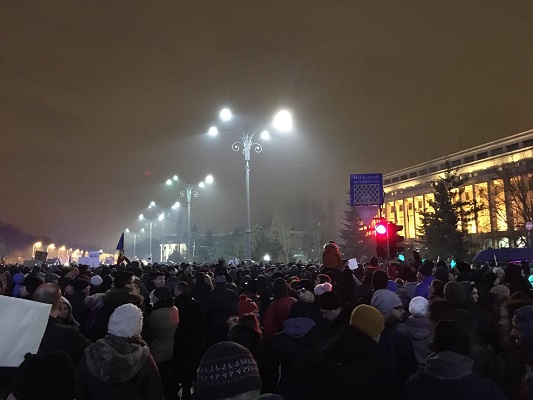“We see you”. This short message, projected on a building near the Romanian government’s headquarters, was the main message from hundreds of thousands of people to their politicians. At 9 PM local time, on Sunday, 5 February 2017, some 250,000 people turned on their mobile phones’ flashlights, in a symbolic gesture of “shedding light on corruption”. A total of 600,000 people gathered in Romania that night, making it the largest protest movement in the country since 1989.

Six days earlier, on Tuesday night, Minister of Justice Florin Iordache announced that a new ordinance would decriminalize official misconduct involving sums less than 200.000 lei (approximately 44.000 EUR). This decision was made in secret and announced around midnight.
The measure would have directly benefited dozens of politicians, including the leader of the governing Social Democratic party and the president of one of the parliament’s chambers, Liviu Dragnea.
Dragnea is currently under investigation for inciting official misconduct with damages of approximately 24,000 EUR. He also has a previous conviction for attempted electoral fraud. If the new ordinance were to take effect, these new charges against him would vanish.
Half an hour after the announcement, angry protesters swarmed into Piața Victoriei, the square in front of the government’s headquarters, demanding that the cabinet step down.
The protesters asked the government to rescind the law – or to subject it to a proper period of scrutiny, including parliamentary debate. The move on Tuesday evening came as a shock for many Romanians.
Andrei Fântână, 40, a musician, was one of the people who took to the streets on Tuesday night, immediately after the ordinance was announced. He has always stayed away from politics – until now.
“My dad was a political prisoner for six years and he couldn’t change anything. So I preferred to do my job, to pay my taxes, to tell myself that this is the best way to serve my country – and if more people would do the same, everything would turn out fine. But it looks like the educated members of society have stopped being involved.”
Until now, he has usually found satisfactory explanations for events around him. But not this time. “The game has changed.”
The hour was late. But Facebook brought thousands out into the streets. Soon after midnight, with the temperature at -7 Celsius, about 15,000 people stood chanting in front of government headquarters.
Some in the crowd were trying to spot cars carrying government officials, but they had already left the building.
The crowd chanted “[You did it] at night, like thieves!” Major cities like Cluj, Timișoara and Iași also erupted in protest.
As people took to the streets, around 1.20 AM, the document was published in the Official Gazette, rendering it legal.
Răzvan Dumitru, 38, an anthropologist who was among the crowd in front of government headquarters that night, believes that this document is the first step towards a dictatorship.
“It looks like an enormous abuse of power that uses legislative trickery to put [some people] above the law,” he said. “It is the beginning of an administrative system that will be partly immune to legal controls. (…) It opens the door for the state or officials to mistreat citizens.”
Politicians’ rush to implement this measure is understandable. In the last decade, the National Anti-Corruption Directorate (DNA) – an institution created before Romania became a member of the European Union – prosecuted and obtained convictions for hundreds of high-ranking officials, including former prime minister Adrian Năstase, members of the government and parliament, mayors, judges and police chiefs.
In 2015 alone, the DNA prosecuted 1.250 defendants, including former prime minister Victor Ponta and five members of his government.
In late January, a report from the European Commission on the evolution of the Romanian judicial system praised the work of DNA prosecutors.
After the ordinance was published, the Commission released a statement, saying that it is “following the latest developments in Romania with great concern. The irreversibility of the progress achieved in the fight against corruption is essential…”
Additionally, the embassies of the US, France, Germany, Canada and the Netherlands to Romania released a joint statement, criticizing the ordinance and arguing that it will weaken Romania’s position in the international community.
But it was the growing crowds that put the greatest pressure on politicians. Though the groups were diverse in terms of age and social background, young educated Romanians seemed to predominate. Like Andrei Fântână, many of them had not previously shown an interest in politics, but they benefitted from the country’s clear pro-European orientation over the last few years. Traditionally, it is the older generations that have been considered the main electoral base for the current ruling party, the Social Democrats.
On Wednesday evening, the night after the ordinance was announced, over 120,000 Romanians demonstrated in front of the offices of the government, in the capital’s central Piața Victoriei. It was the only evening when violent incidents broke out, after a small group of protesters attacked the riot police. Partly in response to those incidents, thousands of parents brought their children to Piața Victoriei on the following Saturday, for an event called “Education for Democracy”.
That evening, the Romanian prime minister, Sorin Grindeanu, announced that he would organize a government meeting to rescind the ordinance. That decision was published the next day.
But that didn’t stop the crowds in the streets. The protest on Sunday, with a record 600,000 participants, both celebrated this first victory against corruption and heralded a possible new way forward. People now demanded the resignation of the government, which they no longer consider trustworthy. However, in a world where liberal democracies appear to be attacked from all sides, this small Romanian victory brings a bit of hope.
Michael Bird (editor of TheBlackSea.eu) contributed to this report
Vlad Odobescu is a journalist affiliated with the Centre for Investigative Journalism, Bucharest. From October to December 2015 he was Milena Jesenská Visiting Fellow at the IWM.
© Author / Transit Online